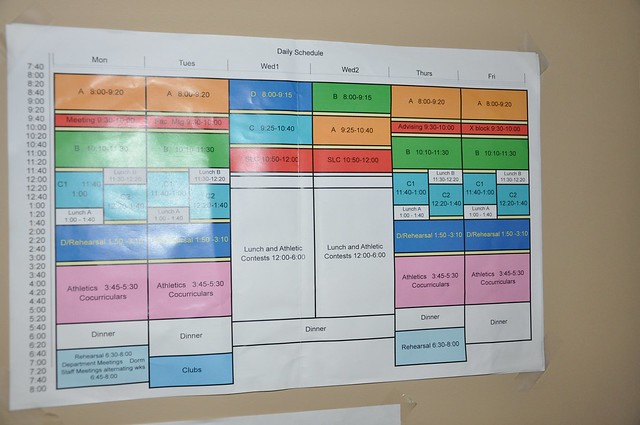Podcast: Play in new window | Download ()
Subscribe: Apple Podcasts | Spotify | RSS | More
The Podcast: Download Or Non-Flash Playback

Block scheduling is typically associated with education. This is what Wikipedia says:
Block scheduling is a type of academic scheduling in which each student has fewer classes per day (e.g. 4) but each class is scheduled for a longer period of time (e.g. 90 minutes). In one form of block scheduling, a single class will meet every day for a number of weeks, after which another class will take its place. In another form, daily classes rotate through a changing daily cycle.
Blocks offer more concentrated experiences of subjects, with fewer classes daily. There may be a less regular rhythm of homework for any given class.
Conversion to block scheduling became a relatively widespread trend in American middle schools and high schools in the 1990s. Prior to that, many schools scheduled classes such that a student saw every one of their teachers each day. Classes were approximately 40–60 minutes long, but under block scheduling, they became approximately 90 minutes long.
Years ago I began to implement block scheduling in business because it addressed a number of challenges I was facing at the time. Constant interruptions. Inability to spend focused time on specific issues. Conflicting schedules with team members. Allowing unimportant, but urgent issues to demand most of my attention.
Lifehacking hadn’t yet been invented. Neither had lifestyle design. I was just a young business guy searching for a way to fix my problems.
One evening I thought back to an early college class required of all incoming freshmen. It included a variety of helpful tips aimed at making us successful college students. How was I to know that some years later a seemingly well-intended, but worthless class (or so I thought at the time) would serve me as a business leader?
In this initiation class we were introduced to study habits that included setting aside blocks of time for specific tasks or classes. It was a bit of a reverse of what most of us had been taught about homework. All my life it had gone something like this, “Have you done your math homework?” Homework or study was always approached from the specific task required. The task demanded the time.
Business life was no different. Something would come up and we’d have to jump on it. Then something else would happen, and we’d have to stop that…and change directions. It was like doing homework based on solely on the deadline imposed. And it would drive students – and business people – crazy!
In 1975 when I sat in this college initiation classroom I hadn’t thought of devoting a specified time period to a specific pursuit. Sounds odd, huh? Well, it’s true. I had grown up working through homework by doing math, then another subject, then another subject…until I had completed everything. Along the way, there may have been some reading required, or writing, or problem-solving. It was a mixed bag of activity without much organization. The objective was to simply get through it.
Business didn’t seem much different. Just get through it. Here’s a problem. There’s a problem. Sort through them. Any way you can. But unlike school homework, in business you never seemed able to get ahead of the curve. No sooner did you solve one issue, then four more popped up. Maddening.
The instructor advised us to devote specific time to each class. For example, if you had a Biology 101 class on Tuesdays and Thursdays, then decide when you’re going to devote time to your study for Biology 101. You could select an hour block of time on Tuesday and Thursday nights from 7 to 8 or 8 to 9. Devote that time, and yourself, to that time slot for Biology 101. Don’t let the class work dictate your schedule. Instead, dictate your schedule to fit the class. It was a novel idea for me as a student. Through the years, I’ve found it’s a novel concept for most business people, too.
Today’s show is about how block scheduling can help you:
1. Reduce anxiety
2. Get more done
3. Make more money
If you’re uninterested in those benefits, then don’t listen to today’s show. 😉
Go over to iTunes and leave me a good review.
